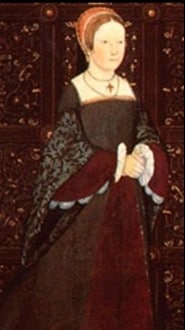 On 22nd June 1536,1 following a threatening visit from members of her father’s council and the arrest of one of her household, Henry VIII’s eldest daughter, Mary, finally submitted to her father, Henry VIII, accepting him as Supreme Head of the Church in England and accepting the invalidity of her parents’ marriage:
On 22nd June 1536,1 following a threatening visit from members of her father’s council and the arrest of one of her household, Henry VIII’s eldest daughter, Mary, finally submitted to her father, Henry VIII, accepting him as Supreme Head of the Church in England and accepting the invalidity of her parents’ marriage:
“Moste humbly prostrete before the feete of Your most excellent Majestie, your most homble, faythefull, and obediente subjecte, which hath so extremely offended Your most gratyous Highnes, that my heavie and fearfull hert dare not presume to calle you Father, ne Your Majesty hathe any cause by my desertes, saving the benignetye of your moste blessed nature dothe surmounte all evelles offences and trespasses, and is ever mercyfulle and redy to accepte the penytente callynge for grace, in any convenyente tyme. Havinge receaved this Thursdaye, at nighte, certene letteres from Mr. Secretary, aswell advisyng me to make my homble submyssyone immedyatly to your selfe, which because I durste not, without your gracyous lycence, presume to doe befor, I latly sente unto him, as sygnefyenge that your moste mercyfull harte and fatherly pyttye had graunted me your blessyng, with condissyone that I should persevere in that I had commenced and begoone; and that I should not eftsones offend Your Majesty by the denyall or reffusalle of any suche artycles and commaundementes, as it maye please Your Highenes to addresse unto me, for the perfite triall of myne harte and inward affectyone, for the perfait declaratyon of the bottome of my herte and stomake.
Fyrste, I knowledge my selfe to have most unkyndly and unnaturally offended Your most excellent Highenes, in that I have not submytted myselfe to your moste juste and vertuous lawes; and for myne offence thearin, which I must confesse wear in me a thousand folde more greevous, then they could be in any other lyving creature, I put myselfe holly and entyrely to your gratyous mercy; at whos handes I cannot receave that punishment for the same, that I have deserved.
Secondly, to opene my herte to Your Grace, in theis thinges, which I have heartofore refused to condiscend unto, and have nowe writtene with myne owne hand, sending the same to Your Highenes hearwith; I shall never beseeche Your Grace to have pyttye and compassyon of me, yf ever you shall perceave that I shall prively or appertly, vary or alter from one pece of that I have writtene and subscribed, or refuse to confyrme, ratefy, or declare the same, wher Your Majesty shall appointe me.
Thurdly, as I have and shall, knowinge your excelent learnynge, vertue, wisdome, and knoledge, put my soulle into your directyone; and, by the same, hathe and will, in all thinges, from hence foarthe directe my consyence, so my body I do holly commyte to your mercye and fatherlye pyttye; desiringe no state, no condissyone, nor no mannore degre of lyvinge, but suche as Your Grace shall appoynte unto me; knoledging and confessynge, that my state cane not be so ville, as ether the extremyty of justice wold appoynte unto me, or as myne offences have required and deserved. And what soever Your Grace shall comaunde me to doe, touchinge any of theyse pointes, ethere for thinges paste, presente, or to come, I shall as gladly doe the same, as Your Majestie cane comaund me. Moste homblye, therfor, beseeching your mercy, most gratyous Soveraine Lord and benigne Father, to have pyttye and compassyon of your myserable and sorowfull child; and, with the aboundance of your inestymable goodnes, so to overcome my iniquitie towardes God, Your Grace, and your holle realme, as I maye feele some sensyble tokene of reconsyllyation; which, God is my judge, I onely desyre, without other respect, to whome I shall dayly praye for the preservation of Your Highenes, with the Queenes Grace, and that it may please him to send you issue. From Hownsdon, this Thursdaye, at 11 of the clocke at nighte.
Your Graces moste humble and obedient Daughter and Handmayd,
Marye”2
Also on this day in history…
- 1528 – Death of William Carey, courtier, distant cousin of Henry VIII and husband of Mary Boleyn. He died of sweating sickness, leaving behind his wife and two children, Catherine and Henry.
- 1535 – Execution of John Fisher, Bishop of Rochester, on Tower Hill. See Bishop John Fisher Executed for more information.
Notes and Sources
- Mary’s submission was undated and although in the State Papers it has been filed as “15 June?”, historians such as David Loades, Linda Porter and Anna Whitelock believe that it was signed on the 22nd June 1536. This would make sense because it is a week after Mary was threatened by her father’s council and after one of her household was arrested.
- State Papers: King Henry VIII, Volume I, Parts I and II, p457-458